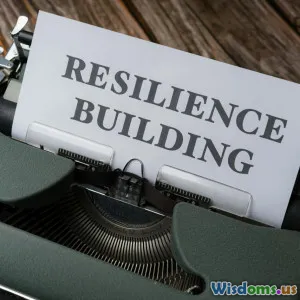
Managing Uncertainty Seven Practical Strategies That Work
11 min read Discover seven effective strategies for managing uncertainty with actionable steps to build confidence and resilience in rapidly changing times. (0 Reviews)
Managing Uncertainty: Seven Practical Strategies That Work
Uncertainty is an inseparable part of modern life. Whether it comes from global events, shifting workplaces, volatile economies, or personal crossroads, everyone encounters moments when the path forward is unclear. Yet, those who manage uncertainty well tend not only to cope—they thrive, adapt, and even turn challenges into opportunities. Let’s explore seven research-backed strategies to help you navigate uncertain times with resilience and confidence.
Recognize and Name Your Uncertainty

One of the biggest hurdles in dealing with uncertainty is identifying it. The human brain is wired to seek predictability, often causing distress in its absence. Yet, simply naming what you’re feeling can help diffuse anxiety’s power. Labeling your emotions (e.g., "I’m anxious because I don’t know what will happen at work next month") engages the prefrontal cortex—the decision-making part of the brain—dampening the amygdala’s fear response.
Example in Practice
Take Sarah, a mid-level manager during a corporate restructure. Instead of brushing aside her apprehension, she regularly journaled her specific worries, such as concern over her role or team dynamics. By delineating each uncertainty, she could prioritize which issues she could influence and which were out of her control, thereby reducing overwhelming feelings.
Tip: Try listing uncertainties as they arise and match each to feelings you are experiencing. This clarity primes you for the next responses.
Stay Grounded in the Present

The fear of the unknown can propel minds into worst-case scenarios. Mindfulness techniques, such as deep breathing, progressive muscle relaxation, or even short meditations, are evidence-backed tools to center yourself in the present.
A 2016 study from Carnegie Mellon University showed that just a short, consistent mindfulness practice improved emotional regulation and reduced stress in high-uncertainty environments. Companies like Google and Intel even offer regular mindfulness training to help employees remain productive and calm through rapid change.
How to Anchor Yourself (Step-by-Step):
- Pause and take five slow, deliberate breaths.
- Notice five things in your environment, four you can touch, three you hear, two you smell, one you taste.
- Acknowledge that the moment is, for now, manageable—even if you don’t have all the answers.
In doing so, you re-center on what is, not what might be, enabling sharper judgment.
Gather Reliable Information Without Overloading

Surprises feel bigger in information vacuums—or when we’re drowning in conflicting news. The challenge is striking a healthy balance between staying well-informed and minimizing unhelpful speculation or misinformation.
- Example: During the early months of the COVID-19 pandemic, some individuals obsessively scrolled through social media, leading to “doomscrolling” and exacerbated anxiety. In contrast, those who identified key trustworthy sources (CDC, local authorities, or reputable news outlets) and scheduled specific times to check updates coped better.
Actionable Advice:
- Choose 2–3 credible sources.
- Set a fixed daily time to review information related to your uncertainty.
- Regularly audit your flow of information—unsubscribe from unreliable newsletters or social feeds.
This proactive approach demystifies uncertainty (“What do I really know?”) while preserving your emotional energy.
Focus on What You Can Control

When circumstances spiral outside of your influence, refocusing on your "sphere of control" is empowering. Behavioral scientists call this the “locus of control,” and it's been linked to greater resilience and lower stress.
Strategies to Regain Agency
- List Action Steps: Jot down all possible ways you can impact your situation, even small ones (e.g., tweaking your daily routine or reaching out to a mentor).
- Set Micro-Goals: Instead of broad resolutions (“find a new job immediately”), aim for daily progress (e.g., update resume today, research target companies tomorrow).
Real-Life Example
When a startup founder faced investor rejection, her team focused on retooling the business pitch and honing their prototype, instead of fretting about market conditions they couldn’t shift. Ultimately, they landed new funding within three months—an outcome enabled by maximized focus on actionable elements.
Build Scenario Plans—But Avoid Perfectionism

Strategic thinkers often ask “what if?” They don’t try to predict the exact future but create flexible plans for multiple plausible scenarios. This is not the same as rigid five-year plans—instead, it’s about readiness over certainty.
Scenario Planning 101
- Identify Core Uncertainties: List top factors likely to affect your situation (e.g., job automation, industry shifts).
- Sketch 2–3 Likely Outcomes: What actions would you take if each occurred?
- Assign Early Triggers: Decide which signals would tell you it's time to adapt (e.g., a new technology gets widely adopted, or a policy changes).
Insight: Be sure to avoid over-planning. Perfectionism tricks you into thinking you need every answer before acting. Decision paralysis can set in. Instead, validate that plans are mere guides to facilitate adaptability, not straitjackets.
Leverage Your Social Networks

Resilience to uncertainty is rarely a solo accomplishment. Harvard’s longitudinal “Grant Study” found that social support was one of the strongest predictors of both physical and emotional health under stress, outperforming even high income or fame.
How to Engage Your Network:
- Proactively reach out to friends or colleagues who have faced similar experiences.
- Join professional forums or community groups relevant to your area of uncertainty (career transitions, parenting, etc.).
- Share—not just your challenges, but insights or resources, building reciprocal trust.
Example
A software professional, facing a sudden layoff, tapped her alumni network, discovered a hidden job opportunity, and landed three interviews within days. Emotional sustenance is just as key: even brief supportive conversations buffer anxiety and nurture hope.
Strengthen Your Adaptability Muscle

Uncertainty rewards those who adapt swiftly. Psychologist Carol Dweck famously dubbed this the “growth mindset”—the belief that your abilities can grow with effort. People with a growth mindset treat failures and shifts as learning moments, not personal setbacks.
How to Practice Adaptability
- Reflect on Setbacks: After facing unexpected challenges, take time to ask what you learned and how you can apply it moving forward.
- Experiment Regularly: Try new ways of working, even small tweaks. Learning new skills or pivoting projects maintains cognitive and emotional elasticity.
- Seek Feedback: Invite honest input from trusted peers about how you adapt; this external perspective uncovers blind spots and opportunities for further growth.
Fact: According to a 2021 World Economic Forum report, adaptability is among the top five future-of-work skills, crucial for both individuals and organizations aiming to survive and thrive in uncertain landscapes.
Uncertainty, though uncomfortable, is fertile ground for growth, innovation, and self-discovery. By integrating these practical strategies—defining your uncertainties, grounding in the present, seeking reliable information, controlling the controllables, planning adaptively, leaning on social support, and strengthening your adaptability muscle—you can transform anxiety into proactive energy. Embracing uncertainty is never about loving the unknown. It’s about learning to move through it with courage, clarity, and confidence—skills that serve in every chapter of life.
Rate the Post
User Reviews
Other posts in Mental Health
Popular Posts


















